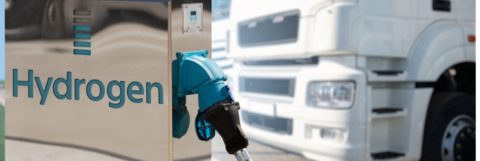Axios Detroit
Joann Muller
Feb. 7, 2024
The outlook for hydrogen-powered vehicles is improving after decades of unfulfilled hype, thanks to unprecedented federal support and increased private investment.
Why it matters: Hydrogen fuel cells produce electricity by mixing hydrogen and air, with water vapor as the only byproduct. That makes them a promising climate solution — especially as a replacement for noisy, soot-spewing diesel trucks and industrial equipment.
- They offer a longer driving range than electric vehicle batteries, and refueling is much faster than recharging, so they could be appealing in passenger cars too.
Catch up quick: Despite its reputation as an abundant and pollution-free energy source, hydrogen has failed to take off as a fuel for many practical reasons.
- For starters, it’s currently derived mostly from natural gas, which undermines its environmental benefits.
- Cleaner hydrogen, made from renewables, is expensive to produce. Plus, there’s no nationwide distribution network.
What’s happening: Two recent U.S. policy moves to boost hydrogen are resurrecting optimism for fuel cell vehicles.
- In October 2023, the Biden administration awarded $7 billion from the 2021 infrastructure law to establish seven regional hubs for hydrogen production.
- In December 2023, the U.S. Treasury Department proposed rules for companies to claim lucrative tax credits for clean hydrogen production under 2022’s Inflation Reduction Act. The IRA also includes tax incentives for fuel cell vehicles, hydrogen infrastructure and energy storage.
- The Biden administration expects all that government spending to spur tens of billions more in private hydrogen investment.
The latest: General Motors and Honda have started producing fuel cells at a factory near Detroit, to power a new plug-in hybrid fuel cell version of Honda’s CR-V crossover utility coming this spring.
- They’ll also go into a line of hydrogen-powered cement mixers, dump trucks, garbage trucks and more that GM is developing with Autocar Industries, a heavy truck manufacturer.
- And GM has a new joint venture with Komatsu to develop fuel cell-powered mining trucks.
Other truck manufacturers are also bringing fuel cell trucks to market, including Toyota, Hyundai and the startup Nikola.
- Cummins has its own twist: It’s developing hydrogen combustion engines, which burn hydrogen instead of diesel fuel — unlike fuel cells, which generate electricity to power a motor.
- And rivals Daimler Truck and Volvo Group teamed up on a new fuel cell venture called Cellcentric that aims to crank up large-scale production by 2025.
Be smart: Hydrogen can make sense for long-haul trucking and round-the-clock freight logistics operations, where time is money.
- But fuel cell passenger cars remain a tiny niche. Fewer than 18,000 have been sold in the U.S. since 2012, and the country has just 55 publicly available hydrogen fueling stations — all in California, where zero-emissions rules are strictest.
- Still, it’s worth noting that none of the early players, including Toyota, Hyundai and BMW, have given up.
What to watch: There’s still a lot of fighting over the hydrogen production tax incentive rollout, as Jael Holzman explains in Axios Pro: Energy Policy.
- Without enough guardrails, environmentalists worry the credit could wind up increasing U.S. carbon emissions.
The bottom line: Fuel cell vehicles have a long way to go — but they may finally have the energy to get there.
- “Up until two years ago, I knew we were in an uphill battle and I didn’t see a wave that would change anything,” says Bill Elrick, executive director of the Hydrogen Fuel Cell Partnership, a joint effort between industry and government to expand the fuel cell vehicle market.
- “I think something has shifted.”

